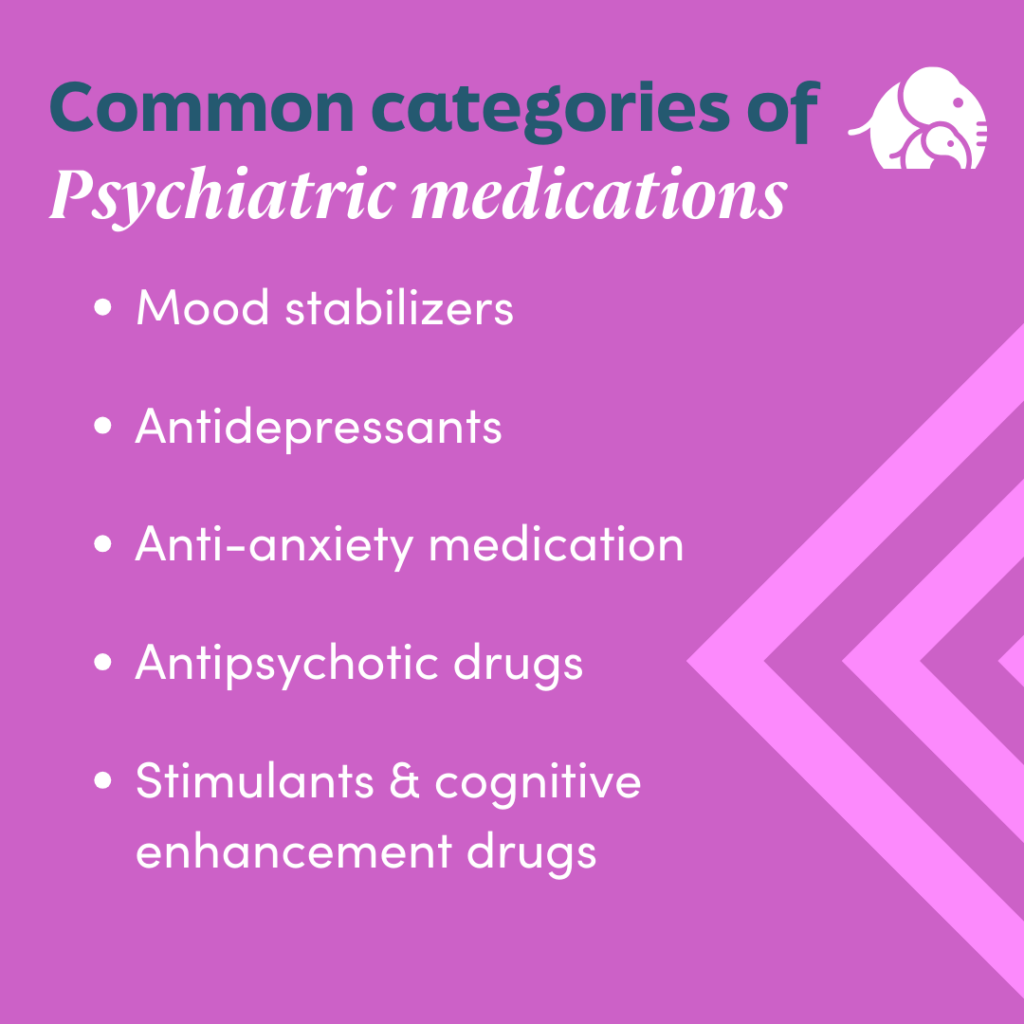Taking the first step on anything can be trying. Newness has all sorts of natural barriers to it, plunging into the unknown. When that unknowability applies to your own mental health, stepping into the world of psychiatric treatment can be daunting. We get it. You have all sorts of questions swirling around in your mind. What is treatment going to be like? Will I need medication? Will the medication work? How do they work? Can’t there be pretty debilitating side effects? Do I even need therapy? Am I going to be, ok?
The stigma around psychiatric medication certainly doesn’t help the situation. Maybe you come from a family who thought mental health was something to be dealt with in private. You might be anxious about people finding out you are taking meds and being judged. Maybe your only conception of a psychiatric clinic is based around those revolting, fetid padded rooms portrayed in Hollywood films. While those depictions couldn’t be further from reality, the images endure.
Unfortunately, many clinics can be uninviting. Cold. Austere. Clinical. Sterile. White brick and linoleum, with those dull, greenish, flickering fluorescent bulbs buzzing like mosquitos in your ears. We can’t deny it, there are establishments designed as intermediaries, places to stop and go before shoving you off to be treated by another set of people in another building. Don’t forget to fill out that paperwork you’ve completed twice already.
Ellie does it differently. Our clinics are warm and inviting.

Our staff—from clinicians to the frontline—are not only some of the most talented people working in their chosen field, but they are unabashedly kind and welcoming. These are passionate individuals who have dedicated their lives to helping people.
Ellie has a full suite of services in-house working in tandem to provide you with truly comprehensive care. Therapy, Medication Management, Transcranial magnetic stimulation, Psychedelic Assisted Psychotherapy, you name it, we do it under our roof. All of our services work in concert with therapy to help you thrive.
Are you ready to connect with a mental health provider to begin your healing path? Find an Ellie Clinic near you today to speak with one of our experts.
About Psychiatric Medications

The field of psychiatry is vast and can easily get overwhelming. This a branch of medicine where there are five brand name formulations of methylphenidate alone, and what even is methylphenidate?! Terminology in psychiatry can become a barrier, and Ellie has a wide range of innovative and effective treatments that can be utilized. We will make sure at each step of this process you have a full understanding of the what and why of your treatment.
There are numerous medications that have been used for many years to reduce people’s symptoms and help them cope with their condition. When it comes to treating mental illness, some of the more common medication categories used by mental health providers include:
- Antidepressants (including SSRIs)
- Anti-anxiety medication or anxiolytics
- Stimulants
- Antipsychotic drugs
- Mood stabilizers
We should also note that multiple medications may be prescribed to treat a specific condition. For example, while antidepressants are largely used to treat various types of depression, antipsychotic medications are mainly used to treat bipolar disorder, or in some cases to enhance other meds used for the treatment of depression.
Check out or other blog to learn more about psychiatric medication management.
Mental Health Medications by Condition
The term “mental health condition” encompasses a multitude of mental disorders, illnesses, and specific conditions, ranging from minimal effect to severely debilitating. Each condition has specific medications that are used for treatment.
Depression
The perpetual cloud. The dark stranger behind your back. You don’t want to get out of bed and feel like nothing will get better. Depression can feel inescapable. We are here to provide you with a door.
Medication used to treat the symptoms of depression include a variety of drugs, each used for delivering a specific response during treatment. Commonly used names for types of drugs to treat depression include:
- Selective Serotonin Reuptake Inhibitors (SSRIs)
- Selective Serotonin Norepinephrine Inhibitors (SNRIs)
- Serotonergic Drugs
- Tricyclic Antidepressants (TCAs)
- Monoamine Oxidase Inhibitors (MAOIs)
- Atypical Antidepressants (Wellbutrin)
What If My Depression Doesn’t Go Away?
There are so many tools we can utilize to treat depression, don’t give up hope! We fully understand the frustration that can come along with going through treatment with little results. For those who have been unsuccessful in the clinical treatment of depression, a combination of medications and Transcranial Magnetic Stimulation (TMS) may be a great solution for treatment-resistant depression.
Check out our other blog to learn more about TMS for treatment resistant depression.
Anxiety
Though anxiety and depression are often associated with each other, they are not the same. However, many antidepressants can be effective in alleviating symptoms of anxiety, such as SSRI medications. Additionally, other medications that affect the neurotransmitter serotonin, such as Buspar, are often used to treat general anxiety disorder.
Perhaps the more widely known medications used for anxiety belong to the family of benzodiazepines, which include medications such as Xanax, Valium, and Ativan. Unfortunately, benzodiazepines can be highly addictive and can have side effects that may prevent you from driving or being able to concentrate at work.
Psychotic Disorder
Psychotic disorders can be intensely isolating, debilitating forms of mental illness involving a loss of connection with reality via delusions, hallucinations, or disorganized thinking. That said, there are tens of thousands of people living successful, healthy lives with psychotic disorders. Psychotic disorders include schizophrenia, schizoaffective disorder, and delusional disorder.
Medications for psychotic disorders are generally used to treat severe conditions that cause delusions or hallucinations, and sometimes to treat severe mood disorders. The trouble with most anti-psychotic medications is that they often produce unwanted and sometimes severe side effects associated with long-term use.
Antipsychotic drugs that may be prescribed include:
- Aripiprazole
- Risperidone
- Quetiapine
- Asenapine
- Cariprazine
- Clozapine
- Lurasidone
- Olanzapine
- Risperidone
- Quetiapine
ADHD
Do you struggle to pay attention, get off task, or find yourself being impulsive and running in circles? You are not alone. Millions of people struggle with ADHD. Attention Deficit Hyperactivity Disorder is one of the most common struggles children may experience. We will work with you to steady the buzz.
Though stimulants are often used to treat ADHD, non-stimulant medications, such as Alpha Antagonists like clonidine or guanfacine, may also be used. Stimulant medications are typically classified into amphetamines and methylphenidates, and these drugs include Adderall, Dexedrine, Concerta, and Ritalin. These medications can affect appetite, heart rate, and blood pressure, but have been found to be extremely effective.
Postpartum Depression
Postpartum depression, otherwise known as the “baby blues,” often occurs right after childbirth or up to a year later. And this condition is treated much like depression which includes psychotherapy techniques such as talk therapy or mental health counseling. However, certain medications may not be prescribed if a mother is breastfeeding.
Typically treated with antidepressants, postpartum depression may also be accompanied by severe anxiety and insomnia, in which case an anti-anxiety medication may be prescribed.
Medications for postpartum depression may include:
- Antidepressants
- Brexanolone (Zulresso)
- Benzodiazepines
- Mood stabilizers
- Anti-psychotics
Check out our other blog for more information on how medications can help PMS or PMDD.
Children’s Mental Health
Many of the same medications used to treat mental illness in adults are the same used to treat children’s mental health. These medications may be prescribed with different doses or have risks and benefits unique to children.
Can Medication Alone Treat Mental Illness?
Medications can help alleviate the symptoms of many mental health conditions and to many people are invaluable. That said, long psychotherapy is essential for long-term wellness. Often both medication and therapy are used in tandem for optimal benefit.
Who Can Prescribe Medication for Mental Illness?
Not all mental health professionals are qualified or licensed to prescribe medication. The following are able to diagnose and treat mental health and prescribe medication:
- Psychiatrist
- Primary Care Physician
- Physician’s Assistants (PAs) with specialized training in psychiatry
- Nurse Practitioner with specialized training in psychiatry
What is Psychedelic Therapy and Can It Be Used as an Alternative?
Psychedelic Assisted Therapy is the process of using psychedelic drugs that may include ketamine, psilocybin, LSD, MDMA, or others usually at a low dose (or high dose in controlled settings). This form of therapy is often used alongside talk therapy and may allow patients to combat addiction, depression, anxiety, PTSD, and other mental health issues.
Patients who engage in psychedelic therapy are often looking for other alternatives away from conventional medications that may have been ineffective. Many have described the experience as a “mental reset” that allowed them to explore their consciousness in other ways.
What Can I Do for Treatment-Resistant Depression?
It’s not uncommon for some treatments to be ineffective for some patients. And this can include both conventional therapy and medications. For treatment-resistant depression, Transcranial Magnetic Stimulation (TMS) can be used as an alternative.
What is Psychiatric Medication Management?
Psychiatric medication management is a process by which your providers guide you toward long-term solutions for treating your mental health using medications. This process includes periodic evaluations of the medication you’ve been prescribed to examine their effectiveness. Thus, if a medication is not working over a period of time, your medications will be adjusted accordingly.
What Are the Dangers of Mental Health Medication Drug Interactions?
Drug interactions can be very serious, but with proper medication management interactions can be avoided. This is why working with a professional mental health provider is essential for managing your medication. For example, for those taking birth control or medications for other conditions, your treatment plan will be tailored to ensure that you don’t experience any adverse drug interactions.
When Should I Consider Medication?
- Clients who are unable to fully engage in therapy due to the severity of their symptoms.
- Clients who have not fully benefited from an adequate therapy trial.
- Clients who may benefit from the combination of medication and therapy.
- Clients with specific diagnoses whom may be more likely to require long-term medication (i.e., ADHD, BPAD, Schizophrenia).
Can You Get Mental Health Medication Online?
Telemedicine is one of the great benefits of living in the age of the internet. Many people who suffer from mental illness suffer in silence, afraid of admitting that something may be wrong, or out of fear of being judged as “crazy.” Telemedicine offers you the option of being diagnosed from the comfort of your home, or your car, even if you’re out for a walk. Anywhere! As long as you have an Internet connection, and are in a secure, private.
Psychiatric Treatment With Ellie Mental Health
At Ellie Mental Health, we take a personal approach to mental health. We want you to feel comfortable and all of our methods and treatments to be approachable, removing any stigma along the way. While you may have a long road ahead of you, allow us to shorten it and ensure you have the best experience possible.
With access to a professional and personable team to guide your treatment and your medication management, you’ll have your own tribe of mental health providers who treat you like the unique individual you are – not like another face in the waiting room.
Ellie Mental Health provides a variety of treatment options including medication management services at many of our locations across the United States. Find your Ellie location to get matched with a therapist and begin treatment that makes a difference.


